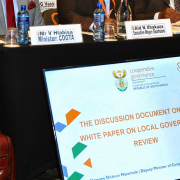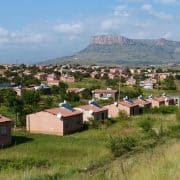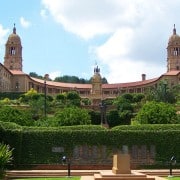|
Getting your Trinity Audio player ready...
|
The first State of Climate Action in South Africa report, released on 26 July, will inform the scaling up of the country’s actions to respond to climate change. This is the word from Forestry, Fisheries and the Environment DG Nomfundo Tshabalala, speaking at the launch event.
The report was commissioned by the Presidential Climate Commission (PCC), an independent, multi-stakeholder body established and chaired by President Cyril Ramaphosa with the goal of overseeing and facilitating a just and equitable transition towards a low-emissions and climate-resilient economy.
The launch coincided with Ramaphosa signing the Climate Change Bill into law earlier that same week.
“[This legislation] sets out a national climate change response, including mitigation and adaptation actions, which also constitutes South Africa’s fair contribution to the global climate change response,” commented Tshabalala.
Mixed findings
The PCC report’s findings are mixed, acknowledging on the one hand that South Africa has strong commitments and public support for tackling climate change and facilitating a just transition, while on the other discussing stumbling blocks such as corruption, inefficient local government, and lack of effective policy implementation.
As a result, “progress is not happening at the pace and scale required to tackle a crisis of such proportion”.
Key barriers to progress include incoherent policies, weak governance structures, insufficient finance, and inconsistent actions by the government and other stakeholders, says the PCC.
“A notable disparity exists between policy ambitions and practical outcomes in South Africa’s approach to climate action. Improved governance structures – capable of efficiently navigating and enacting these policies into tangible results – are critically needed.”
These issues continue to hinder the implementation of climate and just transition policies, the report notes, while urging the Government of National Unity to tackle them as priorities.
The report cites and concurs with other challenges identified in a 2019 research report titled Governance of climate change policy: A case study of South Africa. They include poor clarity on roles and responsibilities of environmental competencies within the government, government departments working in silos, a lack of support to local government, and a poor alignment of policies and programmes.
Other deficiencies mentioned in the PCC report include inadequate human and technical capacity and resources, limited public cohesion on climate action, and limited understanding of climate change and its impacts across both government bodies and local communities.
This is where the newly enacted Climate Change Bill has a role to play, not just by directing and guiding policy but also by “fostering institutional coherence and enhancing climate change adaptation governance across the spheres, national, and sub-national layers of government in South Africa”.
Corruption hinders climate justice
Meanwhile, there is also the ever-present problem of corruption. The years before, during, and after state capture have left South Africa with weakened institutional conditions that impede an effective and just low-carbon transition for the country, says the PCC report.
“Specifically, the impacts of state capture have materialised in recent climate-related disaster events.”
Public funds have been siphoned that could have been invested in stronger adaptation measures, the report states, making the country’s agricultural sector more resilient in both its response to and effect on climate change, or used to help mitigate impacts of environmental hazards, such as the catastrophic landslide damage from the recent floods in KwaZulu-Natal.
Merely holding corrupt or captured officials and leaders, while necessary, is not enough. “Effective solutions require systemic changes to block illegitimate influences on government decision-making and implementation processes.”
Local government’s role
Local governments are often poorly run and this too has implications for climate action, says the PCC report, because many environmental activities happen at the local level.
“They are a critical sphere of government in ensuring climate action, including responding to climate-related disasters, local economic development, implementing adaptation plans and activities, providing infrastructure, and land-use planning and management.”
Local governments lack support from national and provincial governments in many areas, including climate change action. “Some local government departments are unaware of how to select, prioritise, and implement climate actions”.
Their contributions are also hampered by a lack of financial resources, which is getting worse because the financial model used for local government is inherently unsustainable, says the report. In addition, funding supplied to municipalities may be poorly managed, and grants are often only partly spent or not spent at all.
“The Department of Water and Sanitation, for example, is forced to repeatedly provide underperforming municipalities with grants to repair water services infrastructure due to poor maintenance and operation by municipalities.”
This too is unsustainable, and continually playing catch-up diverts funds from where they are needed for development and growth.
“Corruption and cadre deployment, which are much more prevalent in local rather than national government, are often strong indicators of governance failure and are primary drivers for depleting the funding required for effective service delivery.”






